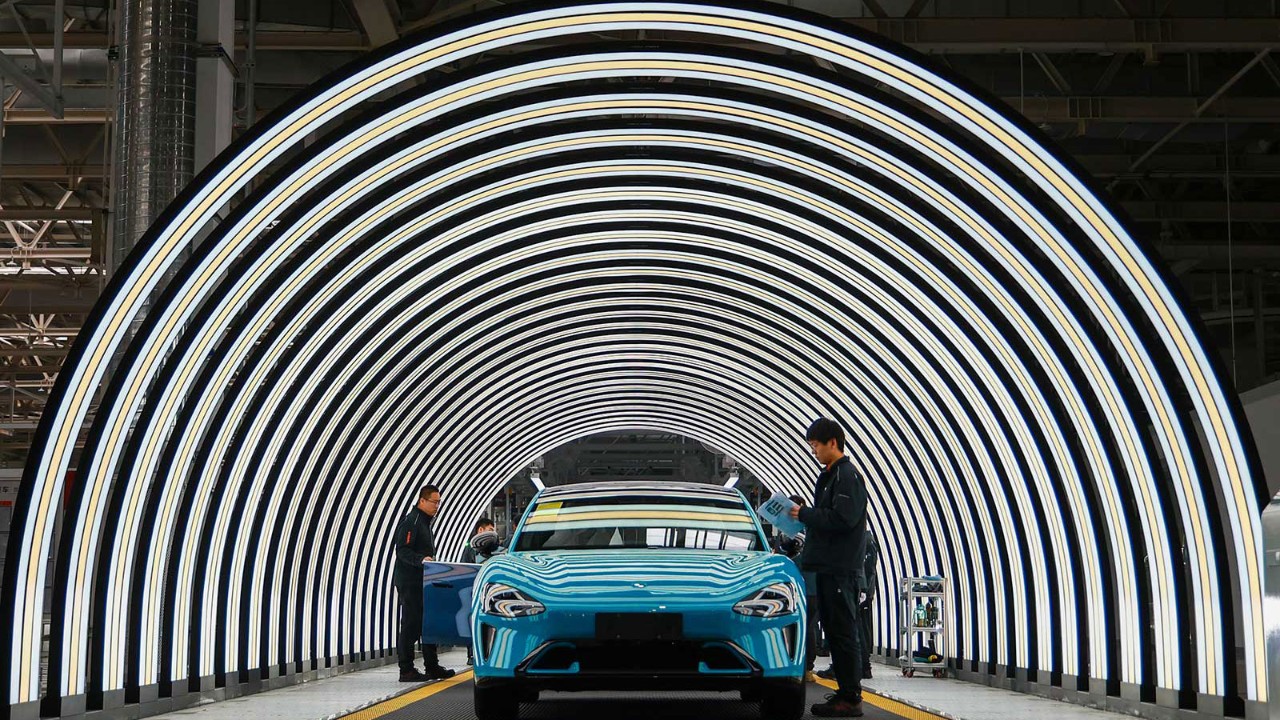
Across the globe, the shift to electrical vehicles (EVs) is gaining pace. In 2023, global sales of electric cars neared 14 million, accounting for 18% of all cars sold. According to the Global EV Outlook 2024 report from the International Energy Agency (IEA), this rapid uptake will translate to a reduction of six mb/d (million barrels of oil per day) by 2030. Potentially, two-thirds of all vehicles sold in 2035 could be electric.
To achieve this, governments around the world are developing policies to enable swift electrification, with new emissions standards recently adopted in Canada, the European Union and the US. Meanwhile, China’s 14th Five-Year Plan of 2020 pledged that the country’s carbon dioxide emissions would peak before 2030 and carbon neutrality would be achieved before 2060.
As early as 2030, almost one in three cars on the roads in China will be electric
China’s commitment is already paying dividends. As early as 2030, the IEA predicts, almost one in three cars on the roads in China will be electric, compared with almost one in five in the US and the European Union.
Industrial incentives introduced by leading EV manufacturing hubs – such as those in the US Inflation Reduction Act, the EU Net Zero Industry Act, China’s 14th Five-Year Plan, and India’s Production Linked Incentive scheme – encourage adding value and creating jobs across EV supply chains in those economies.
Local advantages
In China, several factors have contributed to the success of homegrown EV companies, most notably cost and technology advantages, says Ming Yii, project leader and research manager at Daxue Consulting, which tracks the industry.
Perhaps the most visible example of Chinese EV growth is BYD, which has emerged as the largest producer of EVs in the world. BYD made three million EVs in 2023, including 1.4 million hybrid vehicles. Tesla, by comparison, made 1.84 million EVs.
Government subsidies and R&D incentives have helped China’s EV industry to thrive, says Yii: ‘These policies have facilitated more robust technological innovation and improved EV charging services, leading to a higher adoption rate of EVs. Consequently, economies of scale have been achieved, helping to reduce the cost of manufacturing and owning an EV.’
Chinese carmakers produced more than half of all EVs sold worldwide in 2023
Wider economy
China’s commitment to low carbon emissions has also brought opportunities for other industries. For instance, real estate and property developers can incorporate EV charging infrastructure and smart building technologies into their projects, while exploring the potential of hydrogen fuel, according to a report by KPMG.
Technology companies can also partner with EV manufacturers to bring battery technology expertise to improve the range and efficiency of EVs, according to Chan Ching-chuen, distinguished chair professor of EVs and smart energy at Hong Kong Polytechnic University.
‘Tech companies help automakers integrate connected car technologies that improve user experience,’ Chan says. ‘Technology firms also contribute software and systems that optimise production lines. The use of robotics and AI in quality control and supply chain logistics can lower the cost of EV production and increase manufacturing speed, making EVs more economically competitive.’
Sharper competition
However, China’s EV manufacturers will have to overcome a series of challenges, including intensifying competition, as they grow their share of global markets.
Governments are looking to protect domestic industries – the EU has signalled it may impose higher tariffs on Chinese EVs, for example – so trade wars could be in the offing.
Tariff protection could limit Chinese brands’ access to high-income markets overseas, says Ross O’Brien, analyst-in-chief at Delta Analysis, which tracks technology developments in Asia. ‘It is a challenge for them to break into the high-end market. It is more competitive and led by Western brands like Tesla. To succeed at the higher end, Chinese EV manufacturers need to invest more in after-sales support systems and services, as well as build out other infrastructures.’
‘The Chinese EV industry is poised to seize export opportunities’
Global dominance?
Building on their domestic success, Chinese automakers have now set their sights on global markets. In the fourth quarter of 2023, Chinese brands accounted for 61% of battery-powered EV sales globally, according to research firm Counterpoint.
Yii says: ‘The Chinese EV industry is poised to seize export opportunities in Europe, RCEP [a trading partnership that includes 15 countries in Asia Pacific], the Middle East and Latin America. Europe, in particular, stands out as a major growth destination for China’s new EV export market.’
In the EU, EVs represented 21.6% of all new car registrations in 2022, according to the European Environment Agency, with Belgium, a key market. Chinese companies sold 196,000 passenger EVs in Belgium in 2022. ‘This can be attributed to Belgium’s status as the world’s largest automobile distribution port, providing a convenient channel for Chinese cars to enter the European market expeditiously,’ Yii explains.
However, Chan points out that different safety and environmental standards may be a concern. ‘Different countries have stringent and varying safety and environmental regulations for vehicles. Chinese EVs must meet these specific standards, which can vary widely from those in China, to be allowed entry into foreign markets.’
Strategic moves
Yii says that partnering with domestic and foreign component suppliers as well as technology firms gives Chinese EV manufacturers enhanced access to advanced automotive technology and global distribution network.
Ongoing efforts by Chinese EV makers to refine their offerings and expand into new markets can boost competition and ultimately benefit consumers.
‘Chinese EV manufacturers will increase the intensity of competition in the markets they have entered, boosting technological advancement, improving EV charging services in foreign markets and further lowering the EV prices as manufacturers compete for market share,’ says Yii.
The EV giant
China remains the world’s EV leader, according to EY’s 2023 EV country readiness index, which rates the preparedness of the top 20 vehicle markets for the arrival of EVs. The accompanying report identifies battery manufacturing and supply chain control as key drivers for China. Backed by soaring consumer demand – 58% of Chinese consumer respondents expect to buy an EV as their next vehicle, compared with an average of 41% across other markets – and investment in its charging infrastructure, China is the largest EV market globally in absolute volume terms.

